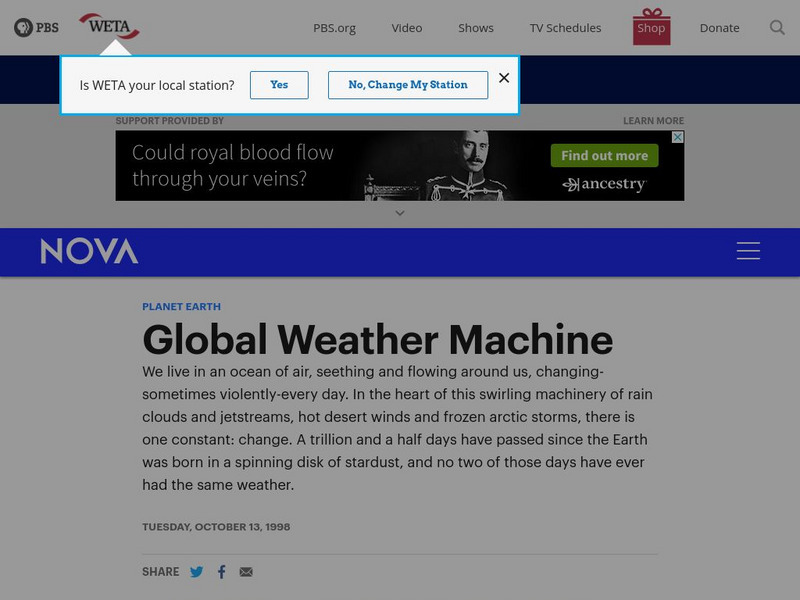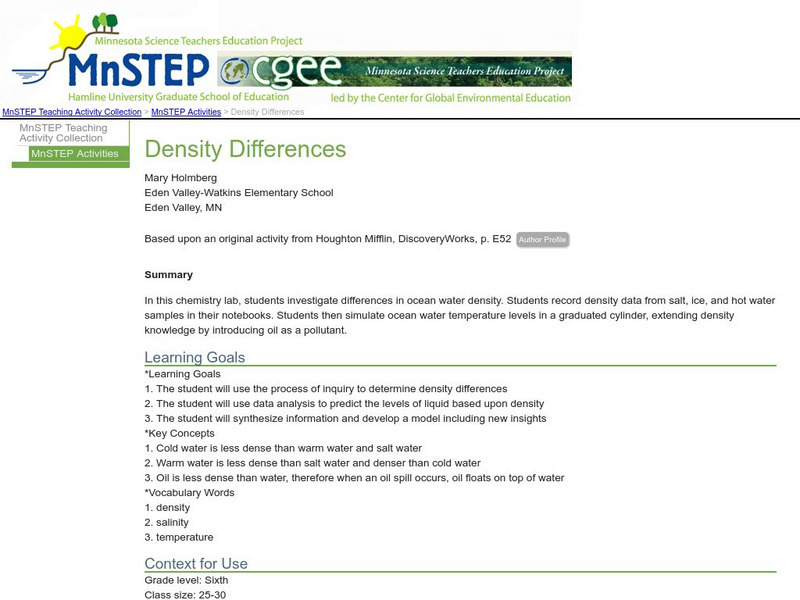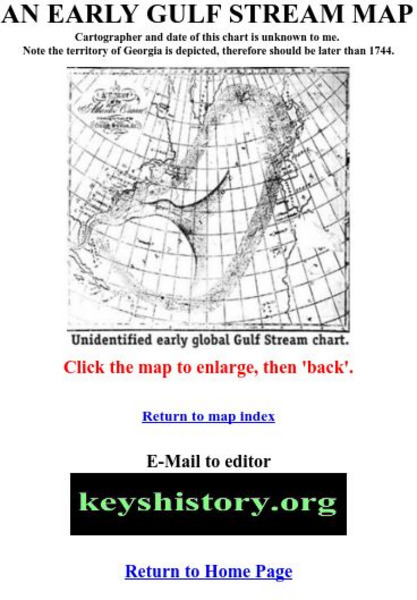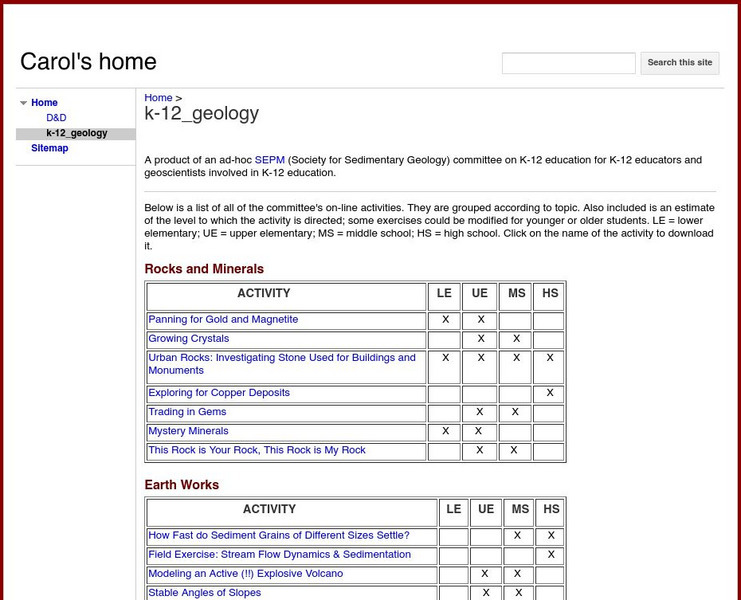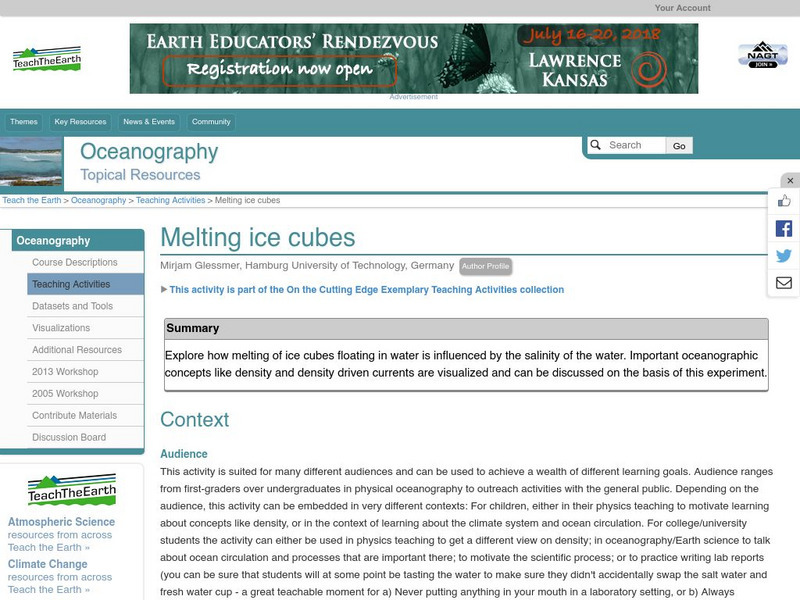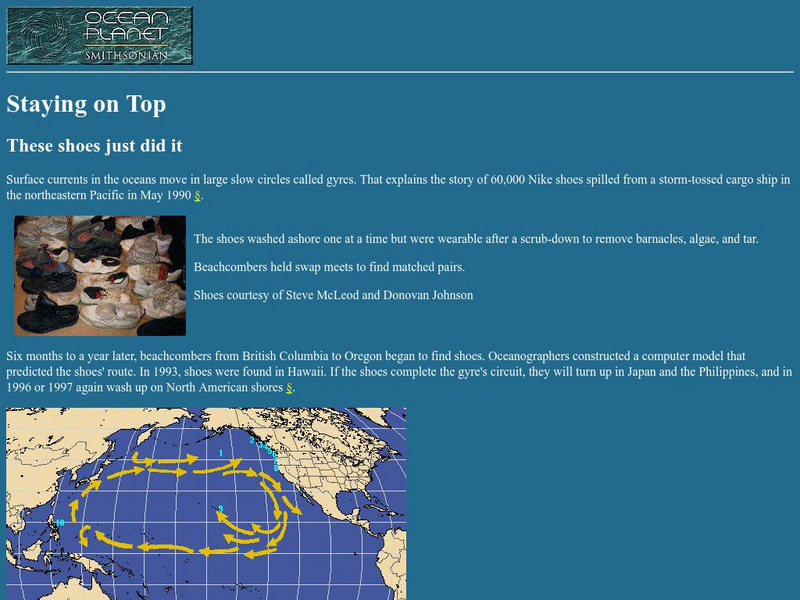Hi, what do you want to do?
Curated OER
Major Ocean Surface Currents
Young scholars investigate wind driven surface currents and prevailing winds by playing a card game. The cards are sorted by north or south and Atlantic or Pacific. They then predict where the two currents are found and what their...
Curated OER
Transformation of Energy-8th Grade
Eighth graders examine how electricity is produced in relation to the atom as well as what causes electric current to flow and what determines how much current flows through a circuit. These and other concepts of transformation of energy...
Curated OER
Ion Flow in Neurons
Student perform an experiment in which they determine the velocity of ion flow in an electrotonic potential and compare it to the velocity of action potentials. They record and analyze their results.
Curated OER
The Inside Current
Eighth graders explore ocean currents and wind patterns. They discover the concept of systems to show how change in one component of a body of water, causes change in other components in that system. Students describe positive and...
Curated OER
Map Field of Current
Students determine that moving charges create a magnetic field. They discover that the speed and direction of motion, the amount of charge, and the deflection angle observed are closely linked. A voltmeter, pendulum, and a constructed...
Curated OER
Oceanography
Fifth graders study the topography of the ocean floor. They determine its ever changing nature as they examine currents and trade winds. They write paragraph describing how the winds might affect land formations after the discussion of...
Curated OER
Currents: Bad for Divers; Good for Corals
Students describe, compare, and contrast major forces that drive ocean currents. They discuss the general effects of topography on current velocity. They discuss how velocity affects the ability
NOAA
Noaa: Tide and Current Glossary [Pdf]
This site offers definitions of the many and varied terms used to describe tides and currents.
American Geosciences Institute
American Geosciences Institute: Oceans
Seven hands-on lessons module in which students explore oceans. Inquiry-based investigations include properties of seawater, ocean water and currents, and features of the ocean floor.
PBS
Pbs Learning Media: Global Weather Machine
In this illustrated essay from NOVA Online, explore the cyclical process of weather creation and the effects of El Nino on the global weather system.
Rice University
Rice University: Ocean Currents and Tides
This URL will start you out at the site map for Rice University's study of longitude and navigation. Scroll to the section titled "Oceans" and you will find some very good information on surface currents, especially those of the South...
Georgia Department of Education
Ga Virtual Learning: Currents, Resistors, and Power
In this interactive tutorial students will learn about electric current, resistance and current density. Learn how current density relates to electric field strength and how resistance produces heat.
PBS
Pbs Learning Media: Coastal Geological Processes
This interactive resource adapted from the National Park Service describes the many forces that affect shorelines, including tides, weathering, erosion, and deposition. Includes background reading handout and discussion questions.
PBS
Pbs Learning Media: Great Ocean Conveyor Belt: Part I
This image from GRID-Arendal depicts the major circulation pattern of the ocean, illustrating interactions between temperature, salinity, and depth. Includes a background reading handout and several discussion questions.
Science Education Resource Center at Carleton College
Serc: Density Differences
Students investigate differences in ocean water density, and record density data from salt, ice, and hot water samples in their notebooks. Students then simulate ocean water temperature levels in a simulation.
Climate Literacy
Clean: Global Ocean Conveyor Belt
This hands-on activity explores the driving forces behind global thermohaline circulation.
Other
Florida Keys History Museum: An Early Gulf Stream Map
This is one of the earliest maps of the Gulf Stream, probably after 1744.
Other
Beloit College: K 12 Geology
This is a good source of basic information about density currents in water. It includes simple activities you can do to demonstrate these currents.
Other
Lunar and Planetary Institute: Oceans From Space
This collection of photographs from space-shuttle missions shows some features of oceanic circulation that simply cannot be seen from any other vantage point. This site is a great resource for many different topics of study.
Science Education Resource Center at Carleton College
Serc: Melting Ice Cubes
This activity helps learners understand how the melting of ice cubes floating in water is influenced by the salinity of the water. It will introduce the concept of density and density driven currents and provide practice in using the...
Smithsonian Institution
National Museum of Natural History: Ocean Planet: Staying on Top
This is the story of the infamous Nike shoes that washed off a cargo ship. The shoes later showed up along beaches, giving oceanographers another clue as to how ocean currents move.
NOAA
Noaa: Ocean Explorer: Hot, Cold, Fresh and Salty
Students simulate ocean water characteristics in order to recognize that the effects of salinity and temperature are the drivers of thermohaline circulation.
PBS
Pbs Learning Media: What Causes the Gulf Stream?
This video segment adapted from NOVA uses satellite imagery to illustrate the Gulf Stream's path and animations to explain how atmospheric phenomena cause it to move. [1:51]
Florida State University
Florida State University: Lenz's Law
Lenz's Law is defined and demonstrated with an interactive Java applet that shows the relationship between field lines of a magnetic and a conductor ring.












![Noaa: Tide and Current Glossary [Pdf] Website Noaa: Tide and Current Glossary [Pdf] Website](https://static.lp.lexp.cloud/images/attachment_defaults/resource/large/FPO-knovation.png)

